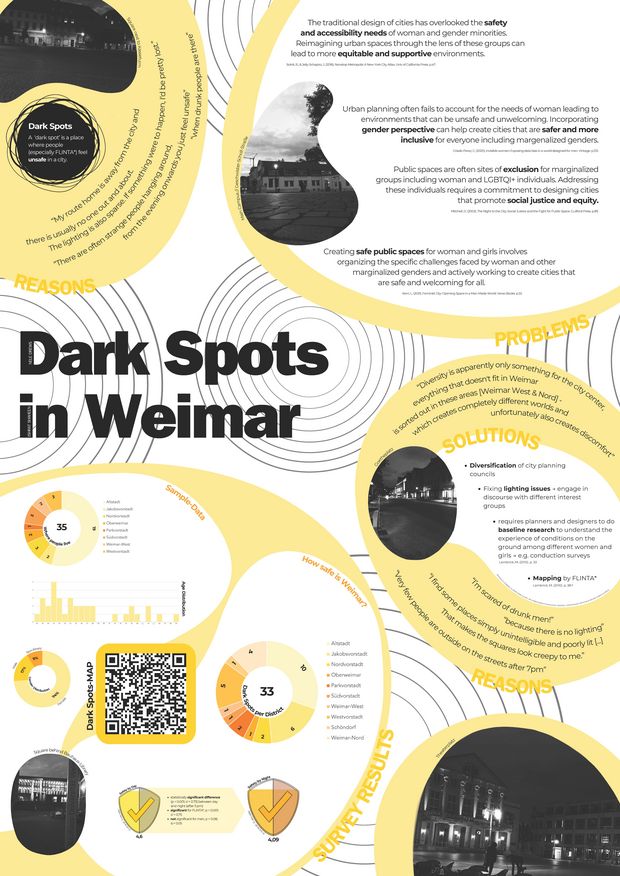What do cities have to do with human rights?
‘‘What do cities have to do with human rights?’ is the Bauhaus.module devoted to the topic of human rights at the local level. The aim of the seminar was to challenge the idea that human rights are just a matter for the United Nations or other high-level organisations that seem quite far from our daily life. During the seminar, students learnt that cities and local civil society can also do a lot to ensure that human rights and sustainability goals are promoted and implemented on the municipal agenda."- Elizaveta
This connection was the focus of the Bauhaus.module titled "What Do Cities Have to Do with Human Rights?", led by Elizaveta Tuneva during the summer semester of 2024 at Bauhaus University.
Elizaveta, a graduate in European Urban Studies, developed the idea for this module based on her personal interest in the practical implementation of human rights across different political contexts. While human rights can sometimes feel abstract or overly academic, Elizaveta's approach brought these issues to the forefront in Weimar, where students could explore them in a real-world context.
Origins and first steps
Elizaveta's inspiration came from research she conducted in Sweden, where she studied how local communities understood and implemented human rights.
“This gave me a perspective of local understanding of human rights, and what challenges there were to work with it. Creating a Bauhaus.module seminar seemed like a very nice idea, especially because I could easily link this topic to Weimar to see how students perceive it.”
In the seminar, students worked to identify local stakeholders and activists involved in human rights, analyse the challenges they face, and explore ways to promote and protect these rights in Weimar.
The courses experience
“To be honest, as this was my first experience of conducting the whole course, I just wanted for somebody to sign up (laughs).”
Finally, the course attracted seven highly motivated students from various disciplines. The diversity in their backgrounds enriched the discussions, offering different perspectives on how human rights could be addressed at the city level.
The course structure began with foundational readings on human rights, followed by a deep dive into the specific challenges of localizing these concepts. Along with traditional lectures, the module featured guest speakers who discussed topics like sustainable development goals (SDGs) and the role of universities in putting human rights into practice. This offered the participating students the opportunity to see how theoretical concepts can be adapted to our work and study environment and explicitly implemented in Weimar.
“For me it was equally important to show and maybe practice different methods of communicating knowledge to the broader audience. This was achieved through organising a feminist city walk (in cooperation with the HerCity Weimar project) and participation in the Summaery2024.”
Student-Led Projects on Human Rights
Three major projects emerged from the module, each addressing a different aspect of human rights in Weimar:
- Accessibility as a Human Right: Andrew Tin Chi and Martina Giannini conducted an analysis of tourism opportunities in Weimar, focusing on how accessible the city is for people with disabilities.
- Being a Non-EU Citizen in Europe: Gizem Kozanoglu, Günsel Sentürk, and Sofia Mauri explored the experiences of non-EU students at Bauhaus University, shedding light on the challenges they face living and studying in Europe.
- Dark Spots in Weimar: Nele Drews and Ishrat Shaheen worked on documenting and mapping places in Weimar where people—especially those identifying as FLINTA* (Female, Lesbian, Intersex, Non-binary, Trans, Agender)—feel unsafe.
These projects used a variety of research methods, including interviews, photography, and workshops, to gather data. The students also created posters for the Summaery 2024 exhibition and gave short presentations to showcase their findings.
In a world where human rights are often framed as distant, large-scale issues, this module shows that cities are powerful spaces where change can happen. Through the lens of Weimar, the students in this seminar explored how local initiatives can contribute to a broader human rights agenda, offering hope and practical solutions for a more just and equitable world.
“I think it is such a wonderful opportunity for students at the university to try out to organize a seminar and explore a topic of their interest with fellow students. From my observations, students are so talented, and when we create an engaging and supporting atmosphere, so many interesting insights can be discovered. I hope students can use obtained knowledge not only in their further studies, but also in their daily life by noticing how even little details are related to human rights and can be improved.”
"I would like to express my gratitude to M. Sc. Anton Brokow-Loga for mentorship and guidance, all the guest speakers for their time and valuable inputs, and the students for their engagement and inspiring projects."
This article is the result of a written interview with the student lecturers of the module.
Title: What do cities have to do with human rights?
Lecturers: Elisaveta Tuneva (stud. MA AU)
Mentor: Anton Brokow-Loga (AU)
Semester: Summer semester 2024




